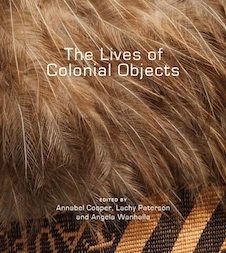Difference between revisions of "The Lives of Colonial Objects"
(→Mini Review) |
|||
| (4 intermediate revisions by the same user not shown) | |||
| Line 6: | Line 6: | ||
== Blurb == | == Blurb == | ||
| − | + | [[File:Lives.jpg|right]]The Lives of Colonial Objects is a sumptuously illustrated and highly readable book about things, and the stories that unfold when we start to investigate them. | |
In this collection of 50 essays the authors, including historians, archivists, curators and Māori scholars, have each chosen an object from New Zealand’s colonial past, and their examinations open up our history in astonishingly varied ways. | In this collection of 50 essays the authors, including historians, archivists, curators and Māori scholars, have each chosen an object from New Zealand’s colonial past, and their examinations open up our history in astonishingly varied ways. | ||
| Line 20: | Line 20: | ||
|{{Pop}} | |{{Pop}} | ||
|} | |} | ||
| − | + | While only one of the objects in this book is strictly archaeological the list of article authors shows archaeologists are well represented, They are here among people who can write about objects while drawing out their role in society, their social history and their relationship to historical figures - some of them well known and others remembered largely within their families. | |
| − | While only one of the objects in this book is archaeological the list of article authors shows archaeologists are well represented among people who can write about objects while drawing out their role in society, their social history and their relationship to historical figures - some well known and others remembered largely within their families. | ||
The range covered is large, the writing exemplary and the scholarship - with a few lapses - impressive. | The range covered is large, the writing exemplary and the scholarship - with a few lapses - impressive. | ||
| − | It is a finely produced book, well illustrated. A few of the historical photographs were poor to start with | + | It is a finely produced book, well illustrated. A few of the historical photographs were poor to start with, but reading the text makes it clear they were included for their historical value. |
| − | This is a distinctly New Zealand book, | + | This is a distinctly New Zealand book, even if a good many articles reflect historical origins of people and objects elsewhere. A book that anyone with an interest in our material culture will cherish. |
[[Law Garry|GL]] | [[Law Garry|GL]] | ||
| Line 35: | Line 34: | ||
[[Category:2015 Books]] | [[Category:2015 Books]] | ||
| + | [[Category:Reviews]] | ||
Latest revision as of 14:52, 3 September 2015
The Lives of Colonial Objects
2015 Edited by Annabel Cooper, Lachy Paterson and Angela Wanhalla. Otago University Press 376 pages, ISBN 978 1 927322 02 4
Blurb
The Lives of Colonial Objects is a sumptuously illustrated and highly readable book about things, and the stories that unfold when we start to investigate them.In this collection of 50 essays the authors, including historians, archivists, curators and Māori scholars, have each chosen an object from New Zealand’s colonial past, and their examinations open up our history in astonishingly varied ways.
Some are treasured family possessions such as a kahu kiwi, a music album or a grandmother’s travel diary, and their stories have come down through families. Some, like the tauihu of a Māori waka, a Samoan kilikiti bat or a flying boat, are housed in museums.
Others – a cannon, a cottage and a country road – inhabit public spaces but they too turn out to have unexpected histories. Things invite us into the past through their tangible, tactile and immediate presence: in this collection they serve as 50 paths into New Zealand’s colonial history.
While each chapter is the story of a particular object, The Lives of Colonial Objects as a whole informs and enriches the colonial history of Aotearoa New Zealand.
Mini Review
This is a POP page.
|
While only one of the objects in this book is strictly archaeological the list of article authors shows archaeologists are well represented, They are here among people who can write about objects while drawing out their role in society, their social history and their relationship to historical figures - some of them well known and others remembered largely within their families.
The range covered is large, the writing exemplary and the scholarship - with a few lapses - impressive.
It is a finely produced book, well illustrated. A few of the historical photographs were poor to start with, but reading the text makes it clear they were included for their historical value.
This is a distinctly New Zealand book, even if a good many articles reflect historical origins of people and objects elsewhere. A book that anyone with an interest in our material culture will cherish.
